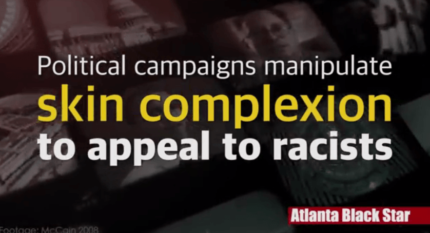At a time when Republicans are busy chopping away at the safety nets for Americans in the form of food stamps and unemployment benefits, a fascinating new book claims that it’s part of the Republican strategy to discreetly appeal to white voters by destroying any program that’s seen as benefiting people of color.
The book is called “Dog Whistle Politics: How Coded Racial Appeals Have Reinvented Racism and Wrecked the Middle Class” by Berkeley Law professor Ian Haney-López and it traces how the Republican Party is now telling voters that they shouldn’t be worried about the rapid concentration of wealth as the threat to their way of life—rather it’s big government pandering to minorities that is their biggest threat.
Haney-López says conservatives use coded racial rhetoric—what he calls “dog whistle politics”—to generate middle-class enthusiasm for conservative policies that threaten their own interests. The terms of the day are expressions like “crack down on crime,” “curb undocumented immigration,” and “protect the heartland” against Islamic infiltration. But as they throw out such terms, Republicans are slashing taxes on the rich, giving corporations control over industry and financial markets, and eradicating social services.
“The narrative is well known, but when put all together, it’s egregious,” Haney-López said. “Yet, when politicians are called to account, they say, ‘It’s just a fact.’ They’re using racially charged terms with plausible deniability. The book explains how race is working this way, how race is the central, defining element of electoral politics. It’s still so powerful in our society even when it seems we’re post-racial.”
Haney-López curiously was a classmate of President Obama on two separate occasions—in high school in Hawaii and years later as law students at Harvard Law School.
In an appearance on Democracy Now with Amy Goodman, Haney-López explained how these racial politics first began under Alabama Gov. George Wallace.
“And so you have George Wallace, a Democrat. He runs as a racial moderate initially in 1958, and he loses,” Haney-López said. “After he loses, he has this incredible moment. He’s about to give his concession speech, and he turns to his cronies, he’s leaving the car, and he says to his cronies, ‘No other son of a b***h is ever going to out-n****r me again.’ And what he means is, ‘I’ve just lost to somebody who ran as a racial reactionary. I’m going to run as a racial reactionary.’ And that’s what he sets out to do, and when he does, he wins. And it’s this moment where it becomes clear: Using race can help you win elections. It goes from George Wallace to Barry Goldwater, a Republican candidate. He uses race. He loses nationally. He wins in the South, right? So, there’s nothing inherent in Republicanism, but it becomes a tactic that is most closely associated with Republicans.”
Last week, Florida Sen. Marco Rubio gave a speech marking the 50th anniversary of President Johnson’s War on Poverty by calling Johnson’s crusade a failure. Rubio said the best way to fight poverty is to take the money the federal government spends on anti-poverty social programs and give it to the states to use as they see fit. Haney-López said this was another form of the dog whistle, another version of the old Republican cry for states’ rights that re-emerged during the Civil Rights Movement.
“If you want to see that in operation, think about the Affordable Care Act and Medicaid,” Haney-López said on Democracy Now. “All across the South, Southern states are refusing to extend Medicaid to the poor, even though it wouldn’t cost them a dime. We know what happens if you devolve social safety net programs to the states. States with an ugly racial history will use it in order to set a floor that effectively helps—that effectively ensures that poor minorities aren’t helped, even if that means the poor in general aren’t helped.”
“We constantly lag in our appreciation of these dog whistles, which are constantly evolving,” Haney-López said. “The point of this sort of analysis is not to say, ‘Hey, there’s a lot of racism against minorities.’ Yes, that’s a problem, but what’s core here is that this sort of racism is being used to fool a lot of whites into voting for Republicans whose main allegiance is to corporate interests. Right? And so, I really want to emphasize this point: This is about race, but this is about race as it affects all of us; this is about race as it wrecks the whole middle class.”



